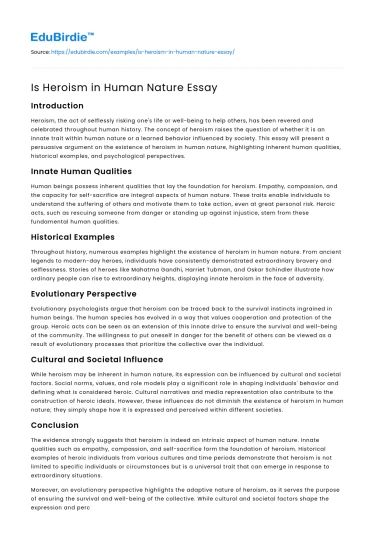Introduction
Heroism, the act of selflessly risking one's life or well-being to help others, has been revered and celebrated throughout human history. The concept of heroism raises the question of whether it is an innate trait within human nature or a learned behavior influenced by society. This essay will present a persuasive argument on the existence of heroism in human nature, highlighting inherent human qualities, historical examples, and psychological perspectives.
Innate Human Qualities
Human beings possess inherent qualities that lay the foundation for heroism. Empathy, compassion, and the capacity for self-sacrifice are integral aspects of human nature. These traits enable individuals to understand the suffering of others and motivate them to take action, even at great personal risk. Heroic acts, such as rescuing someone from danger or standing up against injustice, stem from these fundamental human qualities.
Save your time!
We can take care of your essay
- Proper editing and formatting
- Free revision, title page, and bibliography
- Flexible prices and money-back guarantee
Historical Examples
Throughout history, numerous examples highlight the existence of heroism in human nature. From ancient legends to modern-day heroes, individuals have consistently demonstrated extraordinary bravery and selflessness. Stories of heroes like Mahatma Gandhi, Harriet Tubman, and Oskar Schindler illustrate how ordinary people can rise to extraordinary heights, displaying innate heroism in the face of adversity.
Evolutionary Perspective
Evolutionary psychologists argue that heroism can be traced back to the survival instincts ingrained in human beings. The human species has evolved in a way that values cooperation and protection of the group. Heroic acts can be seen as an extension of this innate drive to ensure the survival and well-being of the community. The willingness to put oneself in danger for the benefit of others can be viewed as a result of evolutionary processes that prioritize the collective over the individual.
Cultural and Societal Influence
While heroism may be inherent in human nature, its expression can be influenced by cultural and societal factors. Social norms, values, and role models play a significant role in shaping individuals' behavior and defining what is considered heroic. Cultural narratives and media representation also contribute to the construction of heroic ideals. However, these influences do not diminish the existence of heroism in human nature; they simply shape how it is expressed and perceived within different societies.
Conclusion
The evidence strongly suggests that heroism is indeed an intrinsic aspect of human nature. Innate qualities such as empathy, compassion, and self-sacrifice form the foundation of heroism. Historical examples of heroic individuals from various cultures and time periods demonstrate that heroism is not limited to specific individuals or circumstances but is a universal trait that can emerge in response to extraordinary situations.
Moreover, an evolutionary perspective highlights the adaptive nature of heroism, as it serves the purpose of ensuring the survival and well-being of the collective. While cultural and societal factors shape the expression and perception of heroism, they do not negate its existence within human nature.
Recognizing and celebrating heroism in human nature can inspire individuals to cultivate these qualities within themselves and promote a more compassionate and courageous society. Encouraging acts of heroism and nurturing empathy and selflessness can contribute to the betterment of humanity as a whole.
In conclusion, heroism is a fundamental aspect of human nature. The innate qualities of empathy, compassion, and self-sacrifice, combined with historical examples and evolutionary perspectives, provide strong evidence for the existence of heroism within human beings. Embracing and nurturing these heroic qualities can lead to a more compassionate and courageous society, where individuals are inspired to act selflessly for the benefit of others.






 Stuck on your essay?
Stuck on your essay?

